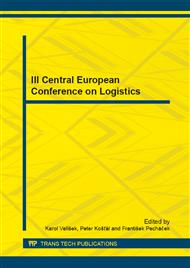[1]
Borkowski S., Salamon S., Selejdak J., Efektywność eksploatacji maszyn i urządzeń, Wydaw. Wydz. Zarządzania Politechniki Częstochowskiej, Częstochowa (2006).
Google Scholar
[2]
Czerska J., Total Productive Maintance, www. zie. pg. gda. pl/~jcz/tpm. pdf, Politechnika Gdańska.
Google Scholar
[3]
Dennis J. Paustenbach (Ed. ), Human and ecological risk assessment theory and practice, Regulatory Toxicology and Pharmacology 37 (2003).
Google Scholar
[4]
Drahňovský J., TPM in Slovakia? Slovak University of Technology, Trnava (2011).
Google Scholar
[5]
Dima I.C., Grabara J., Pachura P., Conceptual approaches regarding the company logistics, [in: ] Polish J. Managem. Stud. Vol. 1, Czestochowa (2010).
Google Scholar
[6]
Kosieradzka A., Smagowicz J., Ciągłe doskonalenie procesów produkcyjnych z wykorzystaniem standaryzacji pracy, [in: ] Ryszarda Knosala R. (ed. ) Komputerowo zintegrowane zarządzanie. T. 1., Ofic. Wyd. Pol. Tow. Zarz. Produkcją, Opole (2009).
Google Scholar
[7]
KPI Report for The Minister for Construction, By The KPI Working Group dated January 2000, Department of the Environment, Transport and the Regions, Londyn (2000).
Google Scholar
[8]
Matryca rozwoju pracownika, Wytyczne przeprowadzenia rozpoznania umiejętności/kompetencji, www. exemplo. de/exemplo/presentation/DOCS/staff_dev_matrix_pl. pdf, Współpraca TNOiK, Leonardo da Vinci i firmy Exemplo.
Google Scholar
[9]
Mitura E. (ed. ), Technika biurowa, Wydaw. Difin, Warszawa (2007).
Google Scholar
[10]
Oechsner R., Pfeffer M., Pfitzner L., Binder H., Muller E., Vonderstrass T., From overall equipment efficiency(OEE) to overall Fab effectiveness (OFE), Materials Science in Semiconductor Processing 5 (2003).
DOI: 10.1016/s1369-8001(03)00011-8
Google Scholar
[11]
Oliverio M. E., Pasewark W. R. , The Office: Procedures And Technology, Cengange Learning, USA (2007).
Google Scholar
[12]
Praca zbiorowa, Zarządzanie organizacją, T. 1, PRET S.A., Warszawa (2011).
Google Scholar
[13]
Reiter-Palmon R., Young M., Strange J., Manning R., James J., Occupationally-specific skills: Using skills to define and understand jobs and their requirements, Human Resource Management Review 16 (2006).
DOI: 10.1016/j.hrmr.2006.05.002
Google Scholar
[14]
Ridley J., Channing J. (ed. ), Safety at Work, Butterworth -Heinemann, Burlington (USA) (2008).
Google Scholar
[15]
Rodrigues M., Hatakeyama K., Analysis of the fall of TPM in companies, Journal of Materials Processing Technology 179 (2006).
Google Scholar
[16]
Rodrigues M., Hatakeyama K., Analysis of the fall of TPM in companies, Journal of Materials Processing Technology 179 (2006).
Google Scholar
[17]
Rogowski A., Podstawy organizacji i zarządzania produkcją w przedsiębiorstwie, Wydaw. CeDeWu, Warszawa (2010).
Google Scholar
[18]
Sarkar D., 5S for Services Organizations and Offices: A Lean Look at Improvements, ASQ, USA (2006).
Google Scholar
[19]
Starostka-Patyk M., Logistyka odwrotna jako narzędzie zarządzania środowiskowego służące przedsiębiorstwom do ochrony środowiska naturalnego, [in: ] Zintegrowane zarządzanie marketingowe i logistyczne w Zjednoczonej Europie. Red. nauk. Lidia Sobolak, Wyd. WZPCzęst., Częstochowa (2005).
Google Scholar
[20]
Ślusarczyk B., Importance of State Support to Development of Sustainable Industrial Policies, [in: ] The Role of Business in Achieving Sustainability. Part 2: Implication for Industry. Ed. V. Modrak, B. Ślusarczyk, Wyd. Techn. Univ. Kosice, Kosice (2010).
Google Scholar
[21]
www. pasmal. pl/galeria/hale. php.
Google Scholar


